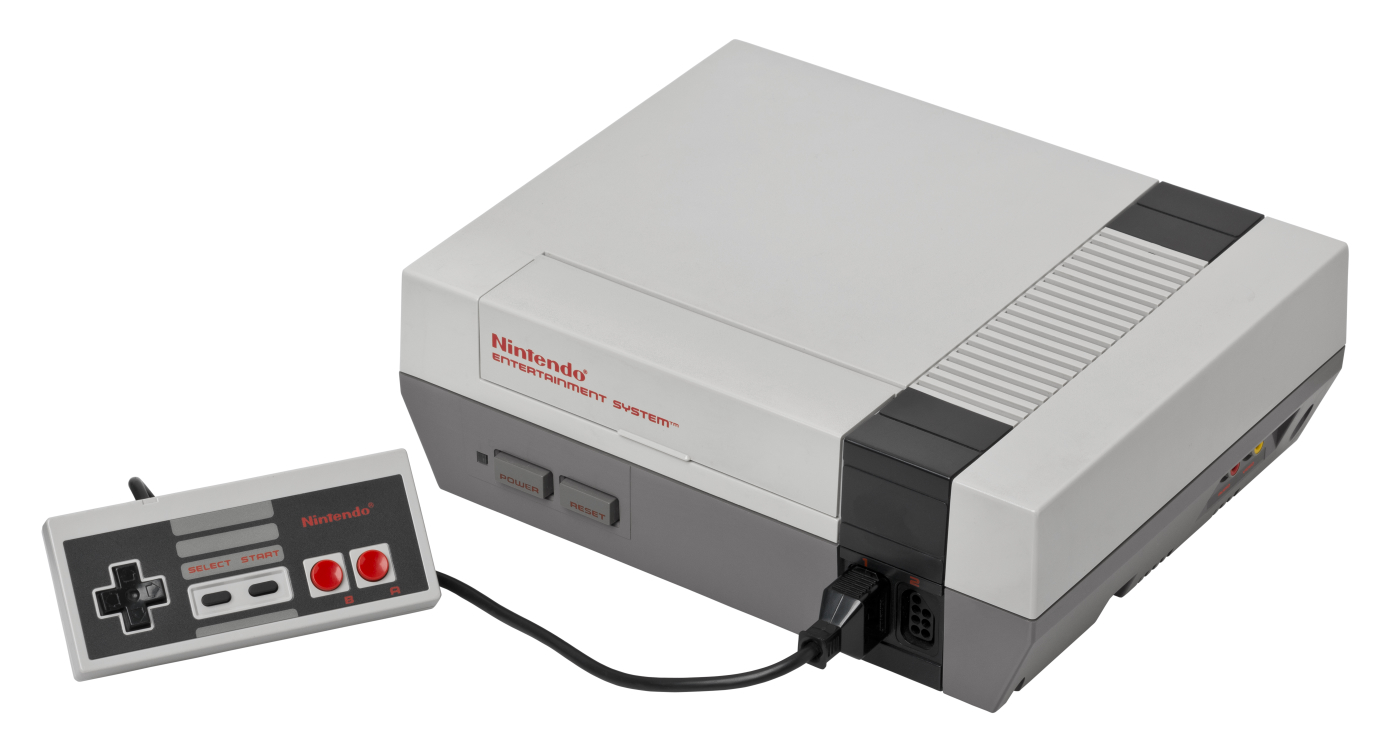
Nintendo Entertainment System
Nostalgia has a lot of haters. “Move on,” people say. “Things now are better than they were. You think you do [want old stuff], but you don’t. You’re just wearing rose-tinted glasses hiding the flaws of all those things you used to enjoy.” Kind of like obesity, it gets attributed to personal weakness or lack of discipline. Being nostalgic is childish, right? It’s a yearning for a time which has passed and for a world that no long exists.
Frankly, I can see their point. I don’t miss VHS tapes getting eaten by a screwy VCR, or having to wait for them to rewind. I don’t miss internet speeds measured in bits per second rather than megabits. I don’t miss the Cold War. I don’t miss the times when various diseases which are now curable were death sentences. Culture, society, science, technology—we’ve made so many amazing advancements in innumerable areas that we have the amazing luxury of getting to take for granted today.
And yet… it’s weird. I actually do miss the era before streaming video services had completely taken over and then fractured, leaving my ability to access media at the whims of Hollywood execs. I fondly recall that brief window before the Internet was a massive advertising duopoly transforming misinformation and anger into profit. I remember a time when politics weren’t entirely a red vs. blue clown show. Beyond all that, though, I kind of miss being bored—or perhaps I miss having to make the most out of my limited options.
The Argument for Nostalgia
I’m certain this is not a new idea—there are areas of academic study entirely dedicated to nostalgia—but I would wager that it’s not always an “overfondness of the past.” Instead, I posit that that nostalgia is frequently a manifestation of dissatisfaction with the state and direction of culture, entertainment, or even society itself.
Before we proceed, let me be clear on the term nostalgia in the context of this article. There are, to me, two definitions of nostalgia which refer to related, but slightly different, phenomena. First is in the same vein as déjà vu: a reflexive feeling one experiences circumstantially, evoking the wistful and sentimental aspects referenced in e.g. the Merriam-Webster definition of the word. In this post, however, I want to focus on something more specific: the desire to evoke that feeling intentionally.
As a feeling, nostalgia might seem unattractive. For many, it carries elements of melancholy and ennui. This is the dissatisfaction I alluded to earlier: contrasting how things were with how they are.
- “Star Wars used to be good, now it’s bad. I miss when it was good.”
- “Video games used to be full of secrets and fun stuff to unlock, now they’re all microtransactions and Skinner boxes. I miss when they were more straightforward.”
- “Politics used to be much more balanced and professional, now it’s a bunch of jokers appealing to the lowest common denominator. I miss when politicians worked for the people.” (Yes, I hear you out there. Yeah, you, the cynical person screaming at their screen that politicians have always been garbage. I’m aware, thanks.)
The common factor here is the desire for a previous state. However, those who actively choose to immerse themselves in nostalgia aren’t focusing on those negative aspects. Instead, they’re purposefully evoking a happiness found in that previous state. Those who seek nostalgia as a feeling are hoping to experience some combination of sentimental reflection and wistful comfort in the way things used to be as a coping mechanism against the way things are today. To put it another way, many of those who indulge in nostalgia are using it to process the trauma of living in the modern world.
Nostalgia as a Vice
Of course there are those who take their nostalgia too far. Some folks will get lost in the past, losing sight of the real world and creating a fantasy for themselves. They craft a version of their ideal world which never really existed, whose scale and scope depends on financial constraint more than self-restraint. Overuse of any sort of coping mechanism is a problem—some people drink too much, some folks spend every non-working hour in an MMO, and others drown themselves in nostalgia. This cannot be held against nostalgia exclusively unless one is willing to start moralizing all coping mechanisms, and I suspect that’s a glass house which can’t withstand too many thrown stones.
It could perhaps be argued that nostalgia is a particularly addictive feeling. An innate emotional reaction with strong psychological effects which can be triggered simply by exposing oneself to the correct stimuli is indeed powerful. It’s a double-edged sword; it’s accessible (for the most part, though hyper-monetizing nostalgic media is becoming more common), effective, and in most cases harmless. But it’s also habit-forming in the same way people can literally become addicted to misery. It’s an unfortunate truth that most of us have some kind of vice. Thankfully, I imagine immersing oneself in nostalgia is healthier than snorting coke, though self-destructive behavior of any kind is still a problem.
Perhaps that’s the only important takeaway here: nostalgia is often referred to as a weakness, an immaturity, or a refusal to let go. I think, for those seeking it out, it’s just like any other hobby, legal vice, or habit. It has its positives and negatives, but often it’s a reactionary defense created to help shield the seeker from some kind of distress (in the scientific sense).
Responding to Change
In my examples earlier, I said that I don’t miss the inconvenience of rewinding VHS tapes. However, I do miss what those tapes represent for me. They’re emblematic of a time before the very concept of ownership was being eroded. When you owned a VHS tape of Star Wars, you owned it. You could watch it over and over, on your own terms, so long as you had a working TV, VCR, and tape. DVDs were largely the same, but Blu-Rays started introducing draconian DRM schemes which often made it challenging to watch the movie without a stable internet connection or a new enough player. Now, much of the media created in the past few years will likely never see a physical release at all, forever to be locked away behind a monthly subscription which will keep going up in price for the foreseeable future. Don’t you kind of miss owning things?
In fact, no one enjoyed rewinding VHS tapes. It was tedious, frustrating, and another point of failure in a system with too many moving parts. But, the instant gratification and expanded capacity of DVDs made entertainment slightly less special. Instead of watching a couple episodes of a TV show at a time, you could catch up on entire seasons with only a few disc swaps. Now, with streaming, you can binge entire shows without ever leaving your couch. Combined with the crippling social media addictions many of us have, well… don’t you often find yourself tuning out the show you just put on? It becomes background noise while you scroll on your phone instead. Don’t you kind of miss being bored?

Amazon Echo Dot
Smart home devices are another example: to get the weather, you used to have to read the newspaper or catch the forecast on TV at the right time. Now you can just ask the friendly little puck to tell it to you… so long as you’re fine with it also listening to every word you say and selling that data to advertisers. Don’t you miss the days before every device in your house was spying on you and boiling you down to advertising metrics?
Each of these examples is part of the nostalgia puzzle. They represent subtle but substantial changes in the ways we experience our lives. I’ve focused primarily on media, but in many ways, fundamental assumptions about the way the world works are being challenged across the board. We’re losing rights, privacy, ownership, and livelihood in a measured erosion, and it’s impossible not to feel that on some level. Some people cope by seeking out nostalgia.
Rejection
Nostalgia is a rejection of the consequences of what we’re told is progress. It’s intentionally putting oneself backwards in time in order to, just for a moment, escape the “dystopic future” it sometimes feels like we’re in. It’s immersing oneself in a context before all of the very real pressure being exerted on us by the numbing manufactured serotonin hits of social media, the glamorous but soulless games full of psychologically-manipulating microeconomies, the dishonest Twitter performances of two-faced politicians getting rich and fat off our division, and so on. Often, it’s allowing oneself to mentally relax within a period of one’s life that was, in some tangible or intangible way, “better” than it is now.
Truthfully, that’s the danger of nostalgia. It’s not the feeling itself, nor the seeking of it, which is harmful. It’s the retreating into the past and giving up on the now. Responsible nostalgia is healthy escapism, but too often nostalgia becomes an excuse to not try and make things better today. It’s easier to just wistfully look backward than to sternly march forward, even though the things we want from the past could, theoretically, exist today in harmony with the very real progress we’ve made. We’ve just got to fight for it ourselves rather than wish for a golden time that never actually existed.
So, Wait… Are You Pro- or Anti-Nostalgia?

"Ignorance is Bliss"
My stance is simple: excessive nostalgia in a population is a symptom that something is wrong. Things will never be perfect, and therefore nostalgia will always exist. We, as people, love to focus on the negatives of today and the positives of yesterday. However, I propose that an abundance of it is a strong indicator that something is fundamentally damaged in society. Like with Neo in The Matrix, it’s a sensation you feel almost subconsciously; a reaction to a stimulus you weren’t even fully aware of. And when you’re choosing how to react to it, you can either choose to escape the Matrix to fight for a better real world, or you can be Cypher, longing so hard for the memory of what used to be that you’d do anything to have it back.
This is where I arrived after reflecting on my own nostalgia. I’ve spent far too much money on 30-year-old video games, dusty old computers, movies from my childhood recorded to a format so outdated they might as well be etched in stone tablets, and keyboards emulating “the good old days.” I even bought a 50-pound hunk of glass, plastic, and analog electronics they used to call a CRT TV—look it up in your history books next to the dinosaurs. And while I will continue to indulge in my escapism from time to time, I recognize that there is a line across which lies a dangerous place full of comfortable wistfulness I could uselessly wallow in for the rest of my life.
So, is nostalgia dangerous? Probably not. Is it healthy? Also probably not. It’s like any other vice or habit: take it in moderation, and use it responsibly. Remember that you can’t go back in time, that the fog of the past makes everything seem simpler than it was, and that no matter what, you still live in the now and have a responsibility to work toward a better today. Maybe if all us nostalgic fools work hard enough to make a better world, future generations will create a lot fewer of us.